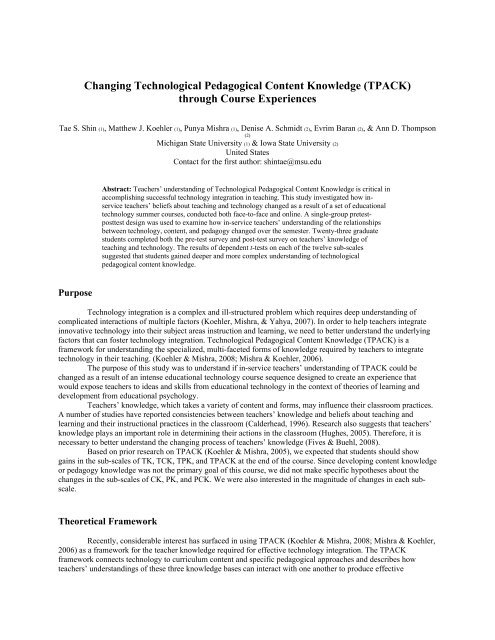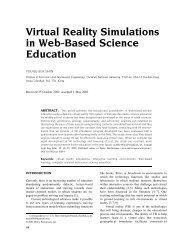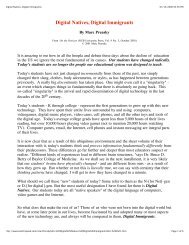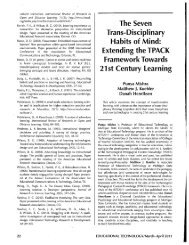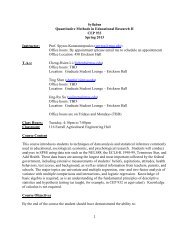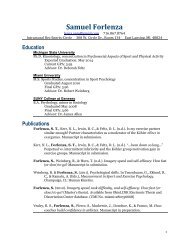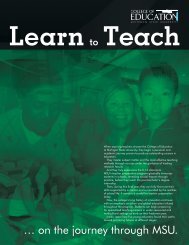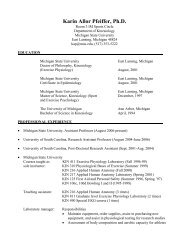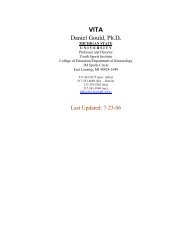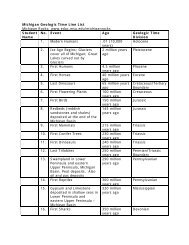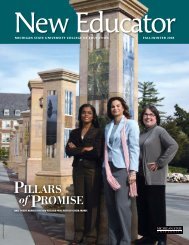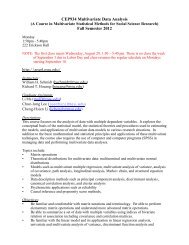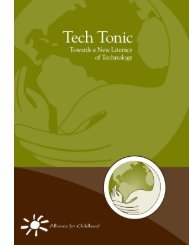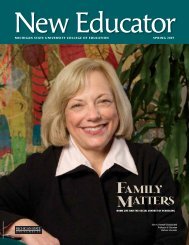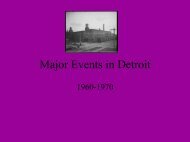Changing Technological Pedagogical Content Knowledge (TPACK ...
Changing Technological Pedagogical Content Knowledge (TPACK ...
Changing Technological Pedagogical Content Knowledge (TPACK ...
You also want an ePaper? Increase the reach of your titles
YUMPU automatically turns print PDFs into web optimized ePapers that Google loves.
<strong>Changing</strong> <strong>Technological</strong> <strong>Pedagogical</strong> <strong>Content</strong> <strong>Knowledge</strong> (<strong>TPACK</strong>)through Course ExperiencesTae S. Shin (1), Matthew J. Koehler (1), Punya Mishra (1), Denise A. Schmidt (2), Evrim Baran (2), & Ann D. Thompson(2)Michigan State University (1) & Iowa State University (2)United StatesContact for the first author: shintae@msu.eduAbstract: Teachers’ understanding of <strong>Technological</strong> <strong>Pedagogical</strong> <strong>Content</strong> <strong>Knowledge</strong> is critical inaccomplishing successful technology integration in teaching. This study investigated how inserviceteachers’ beliefs about teaching and technology changed as a result of a set of educationaltechnology summer courses, conducted both face-to-face and online. A single-group pretestposttestdesign was used to examine how in-service teachers’ understanding of the relationshipsbetween technology, content, and pedagogy changed over the semester. Twenty-three graduatestudents completed both the pre-test survey and post-test survey on teachers’ knowledge ofteaching and technology. The results of dependent t-tests on each of the twelve sub-scalessuggested that students gained deeper and more complex understanding of technologicalpedagogical content knowledge.PurposeTechnology integration is a complex and ill-structured problem which requires deep understanding ofcomplicated interactions of multiple factors (Koehler, Mishra, & Yahya, 2007). In order to help teachers integrateinnovative technology into their subject areas instruction and learning, we need to better understand the underlyingfactors that can foster technology integration. <strong>Technological</strong> <strong>Pedagogical</strong> <strong>Content</strong> <strong>Knowledge</strong> (<strong>TPACK</strong>) is aframework for understanding the specialized, multi-faceted forms of knowledge required by teachers to integratetechnology in their teaching. (Koehler & Mishra, 2008; Mishra & Koehler, 2006).The purpose of this study was to understand if in-service teachers’ understanding of <strong>TPACK</strong> could bechanged as a result of an intense educational technology course sequence designed to create an experience thatwould expose teachers to ideas and skills from educational technology in the context of theories of learning anddevelopment from educational psychology.Teachers’ knowledge, which takes a variety of content and forms, may influence their classroom practices.A number of studies have reported consistencies between teachers’ knowledge and beliefs about teaching andlearning and their instructional practices in the classroom (Calderhead, 1996). Research also suggests that teachers’knowledge plays an important role in determining their actions in the classroom (Hughes, 2005). Therefore, it isnecessary to better understand the changing process of teachers’ knowledge (Fives & Buehl, 2008).Based on prior research on <strong>TPACK</strong> (Koehler & Mishra, 2005), we expected that students should showgains in the sub-scales of TK, TCK, TPK, and <strong>TPACK</strong> at the end of the course. Since developing content knowledgeor pedagogy knowledge was not the primary goal of this course, we did not make specific hypotheses about thechanges in the sub-scales of CK, PK, and PCK. We were also interested in the magnitude of changes in each subscale.Theoretical FrameworkRecently, considerable interest has surfaced in using <strong>TPACK</strong> (Koehler & Mishra, 2008; Mishra & Koehler,2006) as a framework for the teacher knowledge required for effective technology integration. The <strong>TPACK</strong>framework connects technology to curriculum content and specific pedagogical approaches and describes howteachers’ understandings of these three knowledge bases can interact with one another to produce effective
discipline-based teaching with educational technologies. In this framework (see Figure 1), there are threeinterdependent components of teachers’ knowledge: <strong>Content</strong> <strong>Knowledge</strong> (CK), <strong>Pedagogical</strong> <strong>Knowledge</strong> (PK), and<strong>Technological</strong> <strong>Knowledge</strong> (TK).Figure 1: The Components of <strong>Technological</strong> <strong>Pedagogical</strong> <strong>Content</strong> <strong>Knowledge</strong><strong>Content</strong> <strong>Knowledge</strong> (CK) refers to the knowledge about the subject matter that is to be learned or taught.Mathematics, literacy, science, and social science were of particular interests in our study. <strong>Pedagogical</strong> <strong>Knowledge</strong>(PK) refers to the knowledge about the processes and practices or methods of teaching. It includes knowledge aboutclassroom management skills, teaching strategies, evaluation techniques, and the nature of target audience.Technology <strong>Knowledge</strong> (TK) refers to the knowledge about both the standard technologies and more advancedtechnologies. It enables teachers to understand information technology, apply it properly, identify usefultechnologies, and continually adapt to changes in technology (Mishra & Koehler, 2006; Koehler & Mishra, 2008).Equally important within this framework are the interactions among these bodies of knowledge representedas <strong>Pedagogical</strong> <strong>Content</strong> <strong>Knowledge</strong> (PCK), <strong>Technological</strong> <strong>Content</strong> <strong>Knowledge</strong> (TCK), <strong>Technological</strong> <strong>Pedagogical</strong><strong>Knowledge</strong> (TPK), and <strong>Technological</strong> <strong>Pedagogical</strong> <strong>Content</strong> <strong>Knowledge</strong> (<strong>TPACK</strong>). In the following sections we willexplore each of these components, with particular emphasis upon the intersections among the three primarycomponents (Koehler & Mishra, 2005).<strong>Pedagogical</strong> <strong>Content</strong> <strong>Knowledge</strong> (PCK) derives from Shulman’s idea of knowledge of pedagogy that isapplicable to the teaching of specific content (Shulman, 1986). PCK is the knowledge about what teachingapproaches fit the content and how elements of the content can be arranged for better teaching. The model of PCKemphasizes the importance of teachers’ knowing about the learning of their students and the learning environment(Cochran, DeRuiter, & King, 1993; Fives & Buehl, 2008). <strong>Technological</strong> <strong>Content</strong> <strong>Knowledge</strong> (TCK) refers to the
knowledge about the manner in which technology and content influence and constrain one another. The use ofdifferent technologies can impact students’ learning differently. <strong>Technological</strong> <strong>Pedagogical</strong> <strong>Knowledge</strong> (TPK) refersto the knowledge about how teaching and learning change when particular technologies are used. Teachers need tobe equipped with knowledge about various technologies and be able to use them as pedagogical strategies in theirclassrooms. Finally, <strong>Technological</strong> <strong>Pedagogical</strong> <strong>Content</strong> <strong>Knowledge</strong> (<strong>TPACK</strong>) refers to the knowledge thatemerges from an understanding of an interaction of content, pedagogy, and technology knowledge. Quality teachingrequires developing a nuanced understanding of the complex interplays between three key sources of knowledge:technology, pedagogy, and content and how they play out in specific contexts (Mishra & Koehler, 2006; Koehler &Mishra, 2008).Although this framework has helped researchers and practitioners to reason about the relationships betweencontent, pedagogy, and technology, researchers have noted the need to develop: reliable measures for each of thecomponents of <strong>TPACK</strong> framework, agreement about what approaches do (or do not) change teacher’ knowledge,and a sensitivity to the contexts in which these approaches work (or do not work).Koehler and Mishra (2005) investigated the changes in students’ perception about <strong>Technological</strong><strong>Pedagogical</strong> <strong>Content</strong> <strong>Knowledge</strong> using a short survey measure. Our study was in the same vein as the previous studyin the sense that we shared similar research questions (e.g., changes in beliefs), research methods (e.g., pre and posttestcomparison), and the <strong>TPACK</strong> theoretical framework. That said, this study extended the work in Koehler andMishra (2005) which was focused on a specific course, by using a robust survey tool which measured teachers’<strong>TPACK</strong> across multiple contexts.MethodDesignAn one-group pretest-posttest design (Campbell & Stanley, 1963) was used to examine how teachersunderstood the relationships between technology, content, and pedagogy. It was hypothesized that students wouldreport more integrative understanding of technology and its relationship to teaching and content.ProcedureA pre-test survey, which measured students’ initial understanding about the relationships betweentechnology, content, and pedagogy was administered online during the first week of a target course. An identicalonline survey was given out to the students during the final week of the course.ParticipantsThe survey was administered to students in a summer program specifically dealing with technologyintegration in teaching. Twenty-three students enrolled in an hybrid set of educational technology master’s levelcourses, completed the pre-test survey and 17 students completed the post-test survey. The majority of students werefemales (91%). These participants were mostly in-service teachers with several years of teaching experiences.These three courses were covered as an integrated seminar over a period of six weeks — two weeks faceto-faceand four weeks online. For the first two weeks students met on campus every day from 9:00 AM to 4:00 PM.The following four weeks were conducted online, with the students working on projects and assignments.Participants worked on a range of assignments that required them to learn and use technology in multiplepedagogical contexts. These assignments included developing digital video to explore student understanding ofparticular topics, writing a technology based grant proposal for transformative learning, developing a wiki on keytopics in educational technology, and exploring web 2.0 technologies and designing a personal web portfolio.MeasuresA Survey of Teachers’ <strong>Knowledge</strong> of Teaching and Technology (Schmidt et al., 2009) was used in thisstudy. The survey contained 5 demographic questions and 54 self-report items that measured students’ beliefs aboutteaching and technology. The self-report items used a five point Likert scale to rate the extent to which participants
agreed or disagreed with statements about their beliefs on the relationships between technology and teaching. Someof the items had to be revised and rewritten since the original survey was specifically developed for the K-6 preserviceteachers. The survey contained twelve sub-scales because the CK, PK, and TPK scales consisted of multiplesub factors. Each sub-scale included questions that were content specific (e.g., I can teach lessons that appropriatelycombine science, technologies and teaching approaches) and/or content general (e.g., I can choose technologies thatenhance the content for a lesson). The completed survey is presented in the Appendix.Data AnalysisDependent (matched-pair means) t-tests were used to analyze the pre and post test differences for each ofthe twelve sub-scales. For the pre and post test differences in each sub-scale, t-statistics, p-values and Cohen’s dmeasures were reported.ResultsPrior to the dependent t-tests we checked the reliability for each sub-scale using the pre-test data.Cronbach’s alpha coefficients for each sub-scale ranged from .40 to .98.Pre-Test:Sub-ScaleMean(SD.)TK (7 items) .71(.12)CK Social Studies .68(3 items) (.19)Math.75(3 items) (.18)Science.73(3 items) (.16)Literacy.73(3 items) (.15)PK (7 items) .81PCKPedagogyChange(4 items)PedagogySelection(4 items)(.09).77(.19).69(.12)TCK (4 items) .66(.13)TPK Technology.78Impact(.09)(4 items)Technology Use(4 items).78(.11)<strong>TPACK</strong> (8 items) .72(.12)*:p
The results of paired t-tests suggested that students’ knowledge about technology improved as a result ofthe course while their knowledge about content and pedagogy did not improve in general. These results also showedthat students’ understanding of the relationships between technology and content (TCK), the relationship betweentechnology and pedagogy (TPK), and the relationship between technology, pedagogy and content (<strong>TPACK</strong>), allimproved over time. Surprisingly, students’ knowledge about the interaction between pedagogy and content (PCK)changed too.Given that the course was an educational technology course with an emphasis on practical applications oftechnology, this finding was encouraging. Not only did understanding of technology change as hoped, but teachersenrolled in the course gained a deeper understanding of how technology related to other aspects of teaching (mainly,content and pedagogy). Moreover, except for PCK, there was no change on those topics that the course did notaddress.ImplicationsAlthough our findings relied on data yielded from a self-report survey, several important implications forboth research and practice were found. First, we employed quantitative research methods to examine the changes instudents’ understanding about teaching and technology. While several qualitative studies have been conducted toexplore students’ understanding of complex interaction between technology and teaching, few studies have usedvalidated quantitative measures (Koehler & Mishra, 2005). For further research triangulated methods (e.g.,classroom observation, interview) should be employed to examine the changes in in-service teachers’ instructionalpractices. Second, this study showed that questionnaires could serve as an assessment tool to reliably assesscomponents of the <strong>TPACK</strong> framework within the context of teacher preparation courses. Third, from a practicalstandpoint, the findings from our study could provide valuable insight into the development of students’ <strong>TPACK</strong>.We realize the limitation of using the survey method in exploring the relation between the changes inteachers’ knowledge and the improvement in their teacher practices. It is our belief, however, that the changes inteachers’ knowledge can lead to the changes in their classroom practices and that these changes can be reliablymeasured by the <strong>TPACK</strong> survey. This study demonstrates that it is possible to design suitable course experiences toaddress, and develop, students understanding of the knowledge components suggested by the <strong>TPACK</strong> framework.Instructors of educational technology courses can, and should, create innovative courses that can offer authenticopportunities for integrating technology in real teaching.ReferencesCalderhead, J. (1996). Teachers: Beliefs and knowledge. In D. C. Berliner & R. C. Calfee (Eds.), Handbook ofeducational psychology (pp. 709-725). New York: Macmillan.Campbell, D. T., & Stanley, J. C. (1963). Experimental and quasi-experimental designs for research. Boston:Houghton Mifflin Company.Cochran, K. F., DeRuiter, J.A., & King, R. A. (1993). <strong>Pedagogical</strong> content knowing: An integrative model forteacher preparation. Journal of Teacher Education, 44, 263-272.Fives, H., & Buehl, M. M. (2008). What do teachers believe? Developing a framework for examining beliefs aboutteachers’ knowledge and ability. Contemporary Educational Psychology, 33, 134-176.Hughes, J. (2005). The role of teacher knowledge and learning experience in forming technology-integratedpedagogy. Journal of Technology and Teacher Education, 13, 277-302.Koehler, M. J., & Mishra, P. (2005). What happens when teachers design educational technology? The developmentof technological pedagogical content knowledge. Journal of Educational Computing Research, 32, 131-152.
Koehler, M. J., & Mishra, P. (2008). Introducing tpck. AACTE Committee on Innovation and Technology (Ed.),The handbook of technological pedagogical content knowledge (tpck) for educators (pp. 3-29). AmericanAssociation of Colleges of Teacher Education and Rougledge, NY, New York.Koehler, M. J., Mishra, P., & Yahya, K. (2007). Tracing the development of teacher knowledge in a design seminar:Integrating content, pedagogy and technology. Computers & Education, 49, 740-762.Mishra, P., & Koehler, M. J. (2006). <strong>Technological</strong> pedagogical content knowledge: A framework for teacherknowledge. Teachers College Record, 108, 1017-1054.Schmidt, D. A., Baran, E., Thompson, A. D., Koehler, M. J., Shin, T. S., & Mishra, P. (2009). Technology,pedagogy and content knowledge (tpck): The development and validation of an assessment instrument for preserviceteachers. Paper accepted for presentation at American Educational Research Association (AERA) Annual Meeting,San Diego, CA.Shulman, L. S. (1986). Those who understand: <strong>Knowledge</strong> growth in teaching. Educational Researcher, 15, 4-14.
Appendix AA Survey of Teachers' <strong>Knowledge</strong> of Teaching and TechnologyTK (Technology <strong>Knowledge</strong>)I know about a lot of different technologies.I have the technical skills I need to use technology.I keep up with important new technologies.I know how to solve my own technical problems.I can learn technology easily.I frequently play around the technology.I have had sufficient opportunities to work with different technologies.CK (<strong>Content</strong> <strong>Knowledge</strong>)I can use a mathematical way of thinking.I can use a literary way of thinking.I can use a scientific way of thinking.I can use a historical way of thinking.I have various ways and strategies of developing my understanding of mathematics.I have various ways and strategies of developing my understanding of literacy.I have various ways and strategies of developing my understanding of science.I have various ways and strategies of developing my understanding of social studies.I have sufficient knowledge about mathematics.I have sufficient knowledge about literacy.I have sufficient knowledge about science.I have sufficient knowledge about social studies.I know about various examples of how mathematics applies in the real world.I know about various examples of how literacy applies in the real world.I know about various examples of how science applies in the real world.I know about various examples of how social studies applies in the real world.PK (<strong>Pedagogical</strong> <strong>Knowledge</strong>)I can use a wide range of teaching approaches in a classroom setting (collaborative learning, direct instruction, inquirylearning, problem/project based learning etc.).I can adopt my teaching style to different learners.I know how to assess student performance in a classroom.I am familiar with common student understandings and misconceptions.I can assess student learning in multiple ways.I can adopt my teaching based-upon what students currently understand or do not understand.I know how to organize and maintain classroom management.PCK (<strong>Pedagogical</strong> <strong>Content</strong> <strong>Knowledge</strong>)I know that different mathematical concepts do not require different teaching approaches.I know that different literacy concepts do not require different teaching approaches.I know that different science concepts do not require different teaching approaches.I know that different social studies concepts do not require different teaching approaches.I know how to select effective teaching approaches to guide student thinking and learning in mathematics.I know how to select effective teaching approaches to guide student thinking and learning in literacy.I know how to select effective teaching approaches to guide student thinking and learning in science.I know how to select effective teaching approaches to guide student thinking and learning in social studies.
TCK (<strong>Technological</strong> <strong>Content</strong> <strong>Knowledge</strong>)I know about technologies that I can use for understanding and doing mathematics.I know about technologies that I can use for understanding and doing literacy.I know about technologies that I can use for understanding and doing science.I know about technologies that I can use for understanding and doing social studies.TPK (<strong>Technological</strong> <strong>Pedagogical</strong> <strong>Knowledge</strong>)I have the technical skills I need to use technology appropriately in teaching.I can adapt the use of the technologies that I am learning about to different teaching activities.I am thinking critically about how to use technology in my classroom.I have the classroom management skills I need to use technology appropriately in teaching.My teacher education program has caused me to think more deeply about how technology could influence the teachingapproaches I use in my classroom.I can choose technologies that enhance the teaching approaches for a lesson.I can choose technologies that enhance students’ learning for a lesson.<strong>TPACK</strong> (Technology Pedagogy and <strong>Content</strong> <strong>Knowledge</strong>)I can teach lessons that appropriately combine mathematics, technologies and teaching approaches.I can teach lessons that appropriately combine literacy, technologies and teaching approaches.I can teach lessons that appropriately combine science, technologies and teaching approaches.I can teach lessons that appropriately combine social studies, technologies and teaching approaches.I can select technologies to use in my classroom that enhance what I teach, how I teach and what students learn.I can use strategies that combine content, technologies and teaching approaches that I learned about in my coursework inmy classroom.I can provide leadership in helping others to coordinate the use of content, technologies and teaching approaches at myschool and/or district.I can choose technologies that enhance the content for a lesson.


